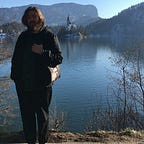Cucina Povera — Q&A
6 min readNov 4, 2018
The highly innovative and experimental Glaswegian artist Maria Rossi, also known as Cucina Povera, released her debut LP, ‘Hilja’, in January earlier this year to a responsive market. A day after performing at Salford’s Sounds From The Other City, she had a brief email conversation with The Sound Basement…
So, my first question is basic and painful, but how can you describe your music; how do you perceive it?
